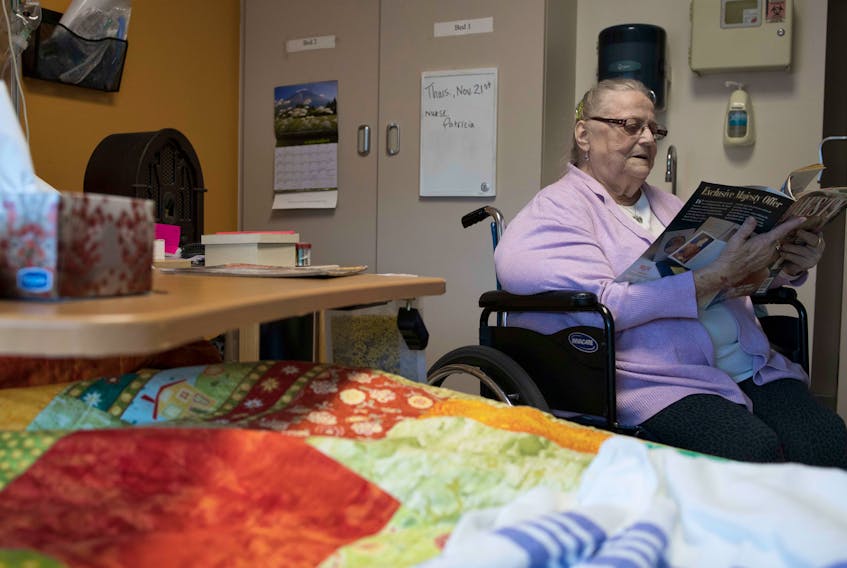The husband of a woman he left at a Bridgewater hospital said he was at his wit’s end after years of caring for her at home.
Mike Flemming, 71, of Chester said he left his wife Elaine at the South Shore Regional Hospital because he could no longer deal with her personal care on his own and he couldn’t afford nursing home care.
“She has COPD, she has diabetes, she has fibromyalgia,” Flemming said in an interview Thursday from his home. “She hasn’t been well for a long time.”
Flemming, who was chair of the former Halifax regional school board in the early 2000s, said he’s had to call 911 many times over the years because his wife is prone to falls. She’s been in a wheelchair since February because she fractured her back in a bathroom fall. That fall occurred after she’d been in bed since December because of pain related to a previous fall.
“I’m telling you this woman, for the last 20 years, there hasn’t been a day she hasn’t been in extreme pain.”
Elaine also had been showing signs of dementia and was sometimes unresponsive, Flemming said.
“I said you can’t release her, I can’t deal with it, I can’t go through this. … If you send her home, I won’t be there.”
- Mike Flemming, husband of Elaine Flemming
“A couple of years ago, I noticed – I went through dementia with my father – I noticed signs with her hands and her speech and her memory and so I went to the doctor, the doctor gave her tests, the doctor said yes she has dementia.”
At that time, her doctors recommended that she be placed in nursing care but Flemming said between the nursing home bills, his own rent, a $500 car payment and other bills, he would have been left with $100 a month.
Flemming said he received little support from other family members and the three to 10 hours of home care service a week he received through the provincial Continuing Care department wasn’t adequate.
“They tried to accommodate you as best they can but you can’t get anything in the night, you can’t get anything on the weekend,” he said, meaning he rarely had the chance to get out of the house.
The breaking point came in early July when Elaine collapsed in the shower.
“I had a hard time getting her (out), I couldn’t get her nightie on,” he recounted. “I’ll be honest with you, I was at the end of my wits, I called 911 and I told 911 that they had to send someone to get her or they would find two bodies here in the morning.
“Because that’s exactly how I felt. I was at the end of my rope.”
In late July, after Elaine had been in hospital for about three weeks, doctors told Flemming she was going to be released.
“I said you can’t release her, I can’t deal with it, I can’t go through this. … If you send her home, I won’t be there.”
Flemming said that in a meeting with the attending doctor, an occupational therapist and a hospital discharge clerk, he slid a bag of her clothes from home across a table to them and left.
He said he was subsequently banned from the hospital for “disruptive behaviour,” which he disputes.
He also disputes accounts from other members of Elaine’s family that he cut himself off from her and was asking for a divorce.
“She told me the marriage was over. She was talking to a lawyer, I was expecting a long time ago separation papers. The marriage was never over from my perspective.”
The Nova Scotia Health Authority said it works with patients to find appropriate community supports when they remain in hospital beyond the point they still require medical care.
NSHA spokeswoman Carla Adams said the number of people who are in a hospital bed but don’t require medical care changes daily and she couldn't provide a current figure Thursday evening.
“I’ve been in touch with several people in the related areas today – namely continuing care, emergency care and our patient flow director,” Adams said in an email. “The challenge I’ve discovered is that while we may know how many people are in beds that have been medically discharged, no two circumstances are the same. In some cases the family will give up decision-making control and Adult Protection gets involved and government becomes the decision maker. Other times the family will continue to make decisions.”
RELATED









